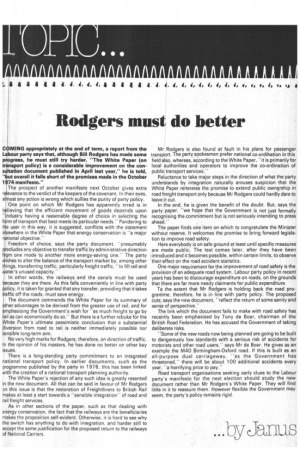Rodgers must do better
Page 63

If you've noticed an error in this article please click here to report it so we can fix it.
COMING appropriately at the end of term, a report from the L hour party says 'that, although Bill Rodgers has made some progress, he must still try harder. The White Paper (on t nsport policy) is a considerable improvement on the con s ltation document published in April last year," he is told, ut overall it falls short of the promises made in the October 1974 manifesto."
The prospect of another manifesto next October gives extra ,elevance to the verdict of the keepers of the covenant. In their eyes, 3i ost any action is wrong which sullies the purity of party policy. One point on which Mr Rodgers has apparently erred is in b I ievi ng that the efficient movement of goods depends upon ndustry having a reasonable degree of choice in selecting the Firm of transport that best meets its particular needs." Pandering to e user in this way, it is suggested, conflicts with the statement sewhere in the White Paper that energy conservation is -a major tional objective."
Freedom of choice, says the party document, "presumably ecludes any objective to transfer traffic by administrative direction F qm one mode to another more energy-saving one." The party ishes to alter the balance of the transport market by, among other t ings, transferring traffic, particularly freight traffic, ''to fill rail and ater's unused capacity."
In other words, the railways and the canals must be used ecause they are there. As this falls conveniently in line with party olicy, it is taken for granted that any transfer, providing that it takes affic oft the roads, must save energy.
The document commends the White Paper for its summary of ther advantages to be derived from the greater use of rail, and for mphasising the Government's wish for "as much freight to go by ail as can economically do so." But there is a further rebuke for the hite Paper's ultimate pessimistic conclusion that a substantial 'version from road to rail is neither immediately possible nor ensible long-term aim.
No very high marks for Rodgers, therefore, on direction of traffic. In the opinion of his masters, he has done no better on other key ssues.
There is a long-standing party commitment to an integrated national transport policy. In earlier documents, such as the Programme published by the party in 1976, this has been linked Nith the creation of a national transport planning authority.
The White Paper's rejection of any such idea is greatly resented in the new document. All that can be said in favour of Mr Rodgers on this issue is that the restoration of Freightliners to British Rail makes at least a start towards a "sensible integration" of road and rail freight services.
As in other sections of the paper, such as that dealing with energy conservation, the fact that the railways are the beneficiaries makes the proposition self-evident. Otherwise, it is hard to see why the switch has anything to do with integration, and harder still to accept the same justification for the proposed return to the railways of National Carriers. Mr Rodgers is also found at fault in his plans for passenger transport. The party spokesmen prefer national co-ordination in this field also, whereas, according to the White Paper, "it is primarily for local authorities and operators to improve the co-ordination of public transport services."
Reluctance to take major steps in the direction of what the party understands by integration naturally arouses suspicion that the White Paper reiterates the promise to extend public ownership in road freight transport only because Mr Rodgers could hardly dare to leave it out.
In the end, he is given the benefit of the doubt. But, says the party paper, "we hope that the Government is not just formally recognising the commitment but is not seriously intending to press ahead."
The paper finds one item on which to congratulate the Minister without reserve. It welcomes the promise to bring forward legislation to improve road safety.
Here everybody is on safe ground at least until specific measures .are made public. The test comes later, after they have been :introduced and it becomes possible, within certain limits, to observe 'their effect on the road accident statistics.
One major requirement for the improvement of road safety is the provision of an adequate road system. Labour party policy in recent years has been to discourage expenditure on roads, on the grounds that there are far more needy claimants for public expenditure.
To the extent that Mr Rodgers is holding back the road pro-. gramme, therefore, he is in line with party policy. The proposed cuts, says the new document, -reflect the return of some sanity and sense of perspective.
The link which the document fails to make with road safety has recently been emphasised by Tony de Boer, chairman of the British Road Federation. He has accused the Government of taking deliberate risks.
"Some of the new roads now being planned are going to be built to dangerously low standards with a serious risk of accidents for motorists and other road users," says Mr de Boer. He gives as an example the M40 Birmingham-Oxford road. If this is built as an all-purpose dual carriageway, "as the Government has threatened," there will be about 100 additional accidents every year, "a horrifying price to pay."
Road transport organisations seeking early clues to the 'Labour party's manifesto for the next election should study the new document rather than Mr Rodgers's White Paper. They will find little in it to reassure them. However flexible the Government may seem, the party's policy remains rigid.




















































































































